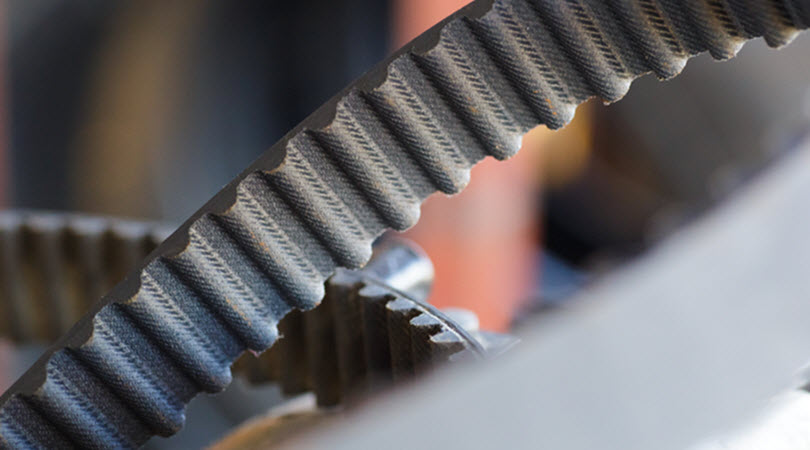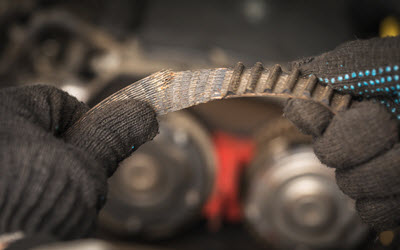
Although Audis are known for being durable and luxurious vehicles, they are also somewhat infamous for having timing belt issues. If your Audi’s timing belt malfunctions, it can lead to serious consequences for the rest of your vehicle, including permanent engine damage. Therefore, all Audi owners should know how to identify and fix a failing timing belt before the problem gets out of hand.
The Timing Belt’s Purpose
Your Audi’s timing belt connects two other components within its engine: the camshaft and the crankshaft. While the camshaft pushes fuel and air into the combustion chamber, the crankshaft uses the energy produced by combustion to rotate the wheels. This process requires very delicate timing in order to succeed, which is where the timing belt comes in. By connecting the camshaft to the crankshaft, the timing belt ensures that these two components move synchronously. Thus, if your vehicle’s timing belt breaks, the engine may lose most or all of its power.
Causes of Timing Belt Failure
Because the timing belt is a central part of your vehicle’s engine, it is regularly exposed to extreme temperatures and pressures. Accordingly, several different factors may lead to timing belt failure, including:
- Excessive belt tension
- Foreign debris
- Oil leaks
- High or low engine temperature
- Pulley misalignment
In addition to these factors, perhaps the most common cause of timing belt failure is age. The timing belt is not designed to last indefinitely, and experts recommend replacing the belt every 100,000 miles. Although this is not guaranteed to prevent timing belt failure, it will greatly reduce your chances of having to deal with timing belt issues.
Identifying Timing Belt Problems
If your Audi’s timing belt does begin to malfunction, it is vital that you identify and fix the problem as soon as possible. Fortunately, because the timing belt is so central to your vehicle’s functioning, timing belt failure usually comes with several symptoms that are difficult to miss.
- Noise: One of the most common symptoms of timing belt failure is engine noise. If your vehicle’s timing belt has begun to break down, then the engine will likely produce a rough rattling sound every time it runs. This will usually be most noticeable when the vehicle starts up.
- Reduced Performance: In addition to unusual sounds, another common symptom of timing belt problems is reduced engine performance. As previously mentioned, timing belt failure often knocks the camshaft and the crankshaft out of sync. If this happens to your vehicle, the engine’s combustion process will become much less efficient, leading to engine misfires and decreased fuel mileage. Thus, if you notice either of these symptoms, you should have your vehicle’s timing belt examined as soon as possible.
- Metal Shavings: A third potential symptom of a timing belt malfunction is metal shavings in your vehicle’s oil. If your Audi’s timing chain is beginning to wear down, small metal chips may break off of it and fall into the oil pan Not only does this indicate serious problems with the timing belt, but it can also cause significant damage to other parts of the engine, as contaminated oil can cause a wide variety of problems. If you find metal shavings in your vehicle’s oil, you will need to take your Audi to a licensed mechanic.
- No-Start Condition: Finally, the ultimate symptom of timing belt problems is failure of the engine to start. If the timing belt has lost several teeth or snapped entirely, you may be completely unable to start your vehicle, as the camshaft and the crankshaft will be out of sync. In this instance, you may notice a slapping sound coming from the engine, as the loose belt moves freely around the area. The best way to handle this scenario is by having your vehicle towed to an auto repair shop, where a professional technician will be able to solve the problem safely and efficiently.
Carotech Automotive: Your Audi Experts
Whether your Audi’s timing belt is completely  loose or just due for a check-up, Carotech Automotive is here to help. For over 50 years, our ASE certified technicians have provided excellent service to customers located throughout Los Angeles, CA. We are the area’s go-to shop for European auto repair and maintenance, and we would love to help you keep your vehicle in the best condition possible, so give us a call or stop by the shop today.
loose or just due for a check-up, Carotech Automotive is here to help. For over 50 years, our ASE certified technicians have provided excellent service to customers located throughout Los Angeles, CA. We are the area’s go-to shop for European auto repair and maintenance, and we would love to help you keep your vehicle in the best condition possible, so give us a call or stop by the shop today.


 you may pay more due to extensive damage.
you may pay more due to extensive damage.



Recent Comments